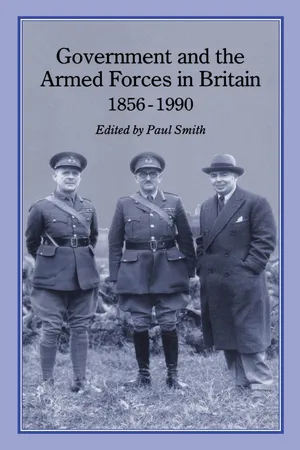
- 344 pages
- English
- PDF
- Available on iOS & Android
Government and Armed Forces in Britain, 1856-1990
About this book
In a period that began with Britain controlling a world-wide empire and included two world wars, followed by the Cold War and massive expenditure on nuclear armaments, the relationship between the politicians and the generals has been central to British history. While it is correctly assumed that the Armed Forces have never threatened British political stability in modern times, the relationship between the military and their political masters is a major, if under-emphasised, theme of British history. While in theory the politicians decided strategy and the military implemented it, in practice decisions often depended on the personalities and experience of those involved. Asquith, the epitome of the civilian, left major strategic decisions in the hands of the military; while Churchill, an ex-soldier and ex-First Lord of the Admiralty, rode roughshod over professional military advice. In a period when arms before ever more technologically sophisticated, there was also the problem of how far politicians could decide on strategies proposed by the military other than by the crude yardstick of cost. The essays in Government and the Armed Forces in Britain, 1856-1990 provide a coherent account not only of the major decision-making of warfare but also of the changes in the organisation and control of the Armed Forces.
Frequently asked questions
- Essential is ideal for learners and professionals who enjoy exploring a wide range of subjects. Access the Essential Library with 800,000+ trusted titles and best-sellers across business, personal growth, and the humanities. Includes unlimited reading time and Standard Read Aloud voice.
- Complete: Perfect for advanced learners and researchers needing full, unrestricted access. Unlock 1.4M+ books across hundreds of subjects, including academic and specialized titles. The Complete Plan also includes advanced features like Premium Read Aloud and Research Assistant.
Please note we cannot support devices running on iOS 13 and Android 7 or earlier. Learn more about using the app.
Information
Table of contents
- Contents
- Preface
- Contributors
- Abbreviations
- Introduction
- 1 Civil-Military Relations in a Period without Major Wars, 1855-85
- 2 Ruling the Waves: Government, the Service and the Cost of Naval Supremacy, 1885-99
- 3 Adversarial Attitudes: Servicemen, Politicians and Strategic Policy, 1899-1914
- 4 'A One-Man Show'? Civil-Military Relations during the First World War
- 5 The Campaign for a Ministry of Defence, 1919-36
- 6 Sir Thomas Inskip as Minister for the Co-ordination of Defence, 1936-39
- 7 Waltzing with Winston: Civil-Military Relations in the Second World War
- 8 'Vested Interests and Vanished Dreams': Duncan Sandys, the Chiefs of Staff and the 1957 White Paper
- 9 The Ministry of Defence, 1959-70
- 10 Establishing Civilian Supremacy: Influence within Britain's Ministry of Defence
- 11 Michael Heseltine and the Reorganisation of the Ministry of Defence, 1983-84
- 12 Conclusion
- Index